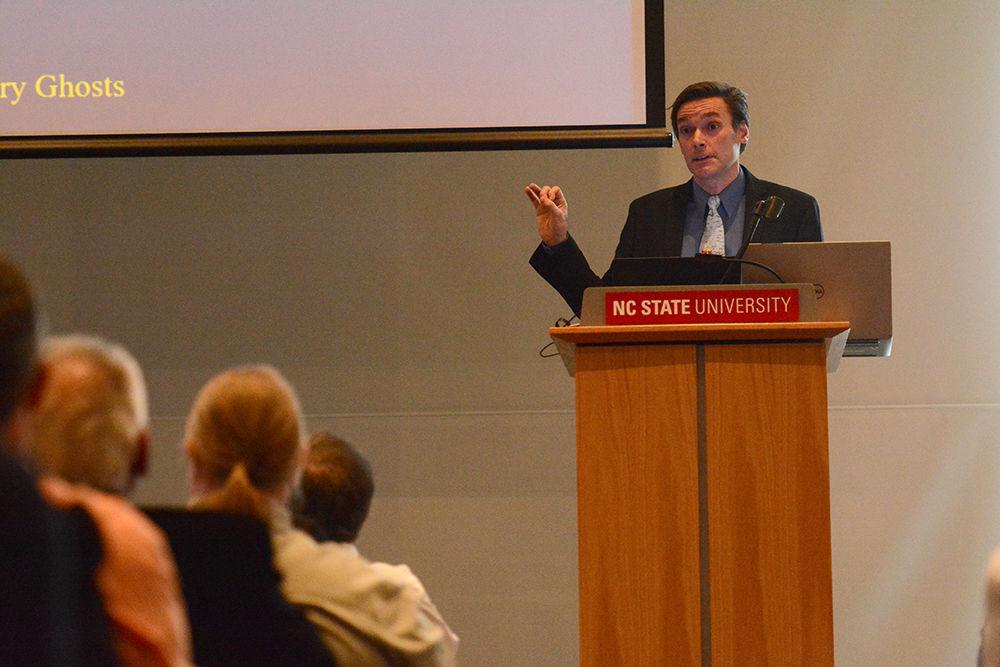The man who laid the groundwork for uncovering the District of Columbia and Flint, Michigan water crises, Marc Edwards, gave a presentation on his scientific career in Hunt Library Tuesday evening.
Edwards, a MacArthur Fellow and professor of civil and environmental engineering at Virginia Tech, spoke on behalf of science as a public commodity, upholding that science should be used to promote the common good.
The lecture followed Edwards’ various experiences with ethical challenges facing STEM professionals. Edwards emphasized a current imperative for ethically educated and compassionate scientists and engineers.
“We do an amazing job of preparing our students for all of the technical challenges that they’re going to encounter,” Edwards said. “But we do an absolutely horrible job in preparing our students for the roles that they may play in terms of science in society.”
Edwards was first exposed to the role of science in society during his undergraduate career at the State University of New York at Buffalo. When Edwards saw how previously dumped chemical waste had impacted the health of elementary school children in the Love Canal disaster, he was driven to “use science to help normal people.” In the following decades, Edwards took initiative to confront fraudulent scientists and indifference to infrastructure mismanagement, specifically in plumbing in D.C.
“It took incredible courage for him to do what he did,” said Chandler Gonzales, a senior studying computer science. “He trusted and was friends with a lot of the people that he was going up against.”
Although Edwards lost his subcontract with the Environmental Protection Agency and was threatened to lose research funding from the D.C. Water and Sewer Authority (WASA), he continued and garnered acclaim for his research on lead contamination in residential plumbing. While arduous, Edwards marked his career as a rewarding time in his life.
“I did lose about 80 percent of the friends that I currently have,” Edwards said. “I can only tell you that it has been an amazing experience working on this, getting up every morning with such a sense of purpose.”
Following an article posted by The Washington Post on the D.C. water crisis, Edwards testified on behalf of his work before Congress. Still, Edwards believed that many other U.S. plumbing systems were at risk for similar lead contamination. Edwards later became engrossed with the lead contamination facing Flint from the story of LeeAnne Walters, a mother of four children affected by the lead-contaminated water in Flint.
“The most powerful scientific force in the universe is a mom trying to figure out what’s wrong with her kid,” Edwards said. “You do not mess with that because that mom will come and mess you up.”
Walters became the face of the Flint water crisis and was thereafter contacted by Edwards. Having sampled Walter’s water at twice the EPA toxicity threshold for hazardous waste, Edwards went on to appeal to politicians and public interest to garner attention for Flint’s hazardous water. By the end of January 2016, two years after the water crisis began, Edward’s research was publicized by hundreds of media outlets across U.S., including the front page of The New York Times as well as Comedy Central. Edwards maintained that through it all, connecting his findings to the people that they related to and seeking empathy was key to his success.
“Emotion is the basis of ethical education,” Edwards said. “If you repress it, you will learn to look the other way every time. You can train scientists to do absolutely horrible things.”
Many students lingered long after the lecture, discussing the ethical implications of Edward’s work in STEM and his school of thought centered on serving the public good.
“He made a good point that everyone is capable of good and bad,” said Jacob Alfieri, a senior studying statistics. “Even with people that do really bad things, you can’t pigeonhole them into being a truly bad person. We have to be mindful of that.”








